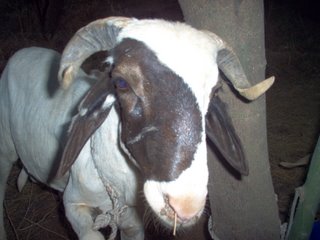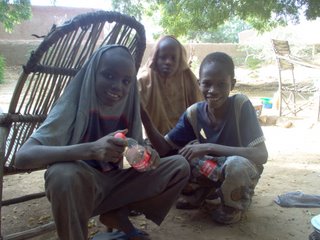 One of my biggest worries coming to Mali was the public transportation. For those of you who know me well, you know that I don't do well with motion sickness. Hell, if I can't even make it on a 30 minute car ride, how do I expect to make it across Africa. My fears were soon realized upon arrival here that travel would be no easy task. There are potholes the size of craters on the moon and people here are worse than drivers in Massachusettes and Quebec - combined!
One of my biggest worries coming to Mali was the public transportation. For those of you who know me well, you know that I don't do well with motion sickness. Hell, if I can't even make it on a 30 minute car ride, how do I expect to make it across Africa. My fears were soon realized upon arrival here that travel would be no easy task. There are potholes the size of craters on the moon and people here are worse than drivers in Massachusettes and Quebec - combined!
After riding on a bus for 12 hours I hated it and I never wanted to do it again. Unfortunately, that's not an option for me. Mali is twice the size of Texas, so you can imagine just how long I'll be spending on the bus. There is a train, but it doesn't service the half of the country where I live. It's probably better - I've heard horror stories. So, I'm still new, still learning the bus system. The thing that gets me the most are the "characters" on the bus. Normally this would mean crazy people but here it refers to anything under the sun that you need transported across the country. I haven't seen anyone go as far as transporting cattle, however, goats and sheep are fair game. My language professor, Daou, just bought two sheep to take to Bamako to have slaughtered for the Tabaski feast. We had to drag them from our house to the bus gare, tie them up in bags and put them in the holding area under the bus. The ride is 12 hours long, meaning that they don't eat, drink or pee for that long. It's kind of sad, right? But on the other hand, it's pretty amusing to be sitting at the gare, waiting for a bus to come by and see a bus with either 50 goats on the top or 200 chickens tied on and holding on for dear life.Above you can find a photo of "Mysterious." Someone will enjoy this sheep for a fete in less than a month. Tear.
Well, thanks to French influences in Mali, there’s a terrible habit that people have picked up. I’m going to call it the “Toubab Syndrome.” When the French were here, way back when, there were mostly only French doctors around. For whatever reason, they were called toubabs. However, the Toubab Syndrome refers to the fact that everyone who is white is now called a Toubab, despite whether or not you’re from France. Well, when I was living in Banankoro, I think I got called a Toubab maybe two or three times. When I came to Douentza, that all changed! Because it’s slightly more touristy here, Douentza being close to Dogon Country, Timbuktu and the Gourma Elephant Reserve, there have historically been more white people here. My first few days it was the worst because I wasn’t used to it. I’d walk down the street and hear, “Toubab! Donnez-moi un cadeau,” meaning Toubab, give me a gift. The first few times, I just looked at these kids like they were crazy. But when one kid calls you a Toubab, it’s like smoke signals to the entire community and kids come out from places you didn’t even know existed to say “Toubab! Donnez-moi un cadeau.” And they don’t say it once and leave you alone for ignoring them, the same kid repeats it at least 6 times. Annoying!
There are variations to this increasingly annoying sentence, however. Often you can replace “cadeau” with “100 francs, ton velo” meaning some money or your bike. The best, however is when they say, “Toubab! Donnez-moi... ” and then pause and look around to see what you’re carrying to figure out what they want. If I happening to be biking back from the market, they demand my bread or my bottle of water or other various things they might see. It’s crazy.
So like I said, at first it would bother me like crazy, and eventually I’ve gotten used to it. I’ve tried to tell them that my name isn’t Toubab, but that it’s Fatumata and that seems to have worked a little bit. I’ve also enjoyed turning to them and saying, “Donnez-moi un cadeau,”or I ask them to give me their notebook or backpack or shoes or something equally as ridiculous. They just laugh at me. When I see they have some money lie 10 or 25 francs, I’ll tell them to give it to and usually they do. I don’t know if it’s out of fear or respect. I obviously don’t take it, but I’ll walk away from them and make them wonder if I’m coming back, and then turn around and return it.
I’ve thought about making one of my projects a trip to the school to teach them not to call me a Toubab, but I was told it was a waste of time. Oh well, it looks like if that’s the most annoying thing in two years, I can handle it.

"
This is Abobocar and his garibout friends - they helped out with Daou when he was here. It's the morning and it's cold, which is why they're shirts are like that. It's a good day for them, we gave them our empty bottles."
Being that Islam is the main religion here, there are certain systems in place that I’m not accustomed to. Now, I’ve talked to a bunch of people and for all intents and purposes, we’re going to consider Mali “Muslim-lite.” By that I mean that almost everyone is Muslim, but they’re not strict. Not everyone prays five time per day, not that many people fasted during Ramadan, a lot of them drink beer, and I’ve even seen some eat pork. In the same vein, there’s no Shar’ia law here and women can show their skin, though they are encouraged to stay covered up. I thought I wouldn’t be able to show any skin but I wear tank tops and skirts (below my knee). So, it’s not that strict. That said, there are those Malians who are diehard Muslims and have their systems. Before I get into the Marabout and Garibout discussion, I will say that I respect each person and the choices they make insofar as religion in their life is concerned. I’m especially culturally sensitive here, though sometimes it’s difficult.
A very common practice in Muslim countries is the existence of Marabouts. A Marabout is a religious figure in the community who knows the Koran and who studies it every day and reads from it everyday. He can also counsel people if they have religious questions and they go to him for advice and for help. In some places, like in Senegal, the Marabouts have a huge say in political issues (yes, Prof. Lambright, I remember the paper I wrote!). Here, however, they’re just the go to people for questions and problems. The other half of the system is the garibouts. Parents can send their children to live with the Marabout and to study the Koran. They lead the hardest lives here that I’ve seen. They are given to the Marabouts and then the Marabouts move around and sometimes these kids will walk for weeks or months, carrying their small belongings and the Marabouts belongings to his final destination. Once they’ve reached the place they’ll live, such as my home Douentza, the Marabout lives in his home and the garibouts live there too, but the Marabout doesn’t take care of the children. They are required to beg for food and/or money and they are allowed to eat the food but they are supposed to give the money to the Marabout. They are seen as the epitome of Muslim. They pray five times per day, they study the Koran for several hours a day, and it’s a crime and a sin to hurt them. So, everyday at lunch and dinner when I’m sitting with my family eating, several garibouts will come to the door/gate and say, “Bido allah garibout,” meaning “garibout friend of Allah.” At this point, people choose whether or not to give them a handful of the rice or toh that we’re eating and they take it and move on to the next house in hopes of more food. This said, most people give food because it’s for the direct benefit of the garibout, but some give money. Okay, so maybe this doesn’t seem heart wrenching yet, but let me finish painting the picture. In a town like Douentza, there are hundrends of garibouts. They wear the most tattered clothes and probably only own two pairs of pants and two shirts, and sandals if their lucky. I’m not sure how often they bathe, some of them maybe once or twice a week because they can’t afford to buy soap. They are easily spotted because they carry around a small bucket for collection of the food they are able to find. Now, let me talk about the relationship between the Marabout and garibout. The Marabout is there as the teacher for the garibout, to teach him Arabic and the Koran. He is supposed to take care of the garibouts also, in so far as clothes and health are concerned. He doesn’t though. He uses the money that the community gives to him to further his own needs and doesn’t take care of the kids. When I first arrived here, I saw a few garibouts who were really sick; you could just tell by looking at them. It’s really sad. Then, about three weeks ago here, I found out that a Marabout beat one of the garibouts so badly that he died. That Marabout is in prison now. As hard as this is to think about, you must understand that being a garibout is an honor to the child and to the family. He is being the supreme religious figure, and has an opportunity to become a Marabout later on.
All that said, you may be sitting here thinking, “Wow, this is a really messed up system.” I don’t agree with it 100% and it’s so difficult to see hundreds of them per day asking for food. And where do you draw the line? If you give one of them some rice and sauce and there are 10 others who see, they rush over to you and expect you to give them food too. Other volunteers have said that I’ll get over how sad it is and realize it’s just a part of everyday life, but I don’t want to lose the compassion in my heart for these kids. I give what I can, and many people pity them and help them out. For example, at my house where I live, the woman who watches over me has taken one named Amadou under her wing. He comes over and helps to wash dishes and bring water from the well and sweep and other household chores. In exchange, he always has food and never has to beg. A picture of Amadou is on its way. If I could bring him home, I would. He’s great to me. Always brings me water for drinking and fills up my bucket for a shower everyday. I can’t wait to really talk to him and get to know him.

